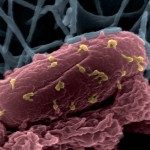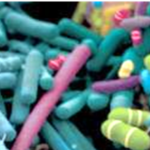Lien vers Pubmed [PMID] – 22118225
Environ. Microbiol. 2012 Aug;14(8):1844-54
Bacteriophages have been known to be present in the gut for many years, but studies of relationships between these viruses and their hosts in the intestine are still in their infancy. We isolated three bacteriophages specific for an enteroaggregative O104:H4 Escherichia coli (EAEC) strain responsible for diarrhoeal diseases in humans. We studied the replication of these bacteriophages in vitro and in vivo in a mouse model of gut colonization. Each bacteriophage was able to replicate in vitro in both aerobic and anaerobic conditions. Each bacteriophage individually reduced biofilms formed on plastic pegs and a cocktail of the three bacteriophages was found to be more efficient. The cocktail was also able to infect bacterial aggregates formed on the surface of epithelial cells. In the mouse intestine, bacteriophages replicated for at least 3 weeks, provided the host was present, with no change in host levels in the faeces. This model of stable and continuous viral replication provides opportunities for studying the long-term coevolution of virulent bacteriophages with their hosts within a mammalian polymicrobial ecosystem.




